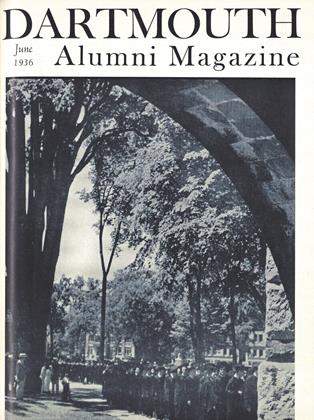Senior Fellowships for the academic year 1936-37 have been awarded to seven members of the junior class, it was announced by President Hopkins following the spring meeting of the Board of Trustees. The undergraduates honored with a year of complete freedom from academic requirements are Wayne K. Ballantyne of Sea Cliff, N. Y.; Rowley Bialla of Northport, N. Y.; Thomas W. Johnson of Nahant, Mass.; George E. Mackey of Brookline, Mass.; Robert E. Olson of Chatham, N. J.; Addison M. Parker Jr., of Des Moines, Iowa; and William H. Timbers of Glen Ridge, N. J.
Under the Senior Fellowship plan, established by the Trustees of the College in 1929, the President upon recommendation of a special administrative and faculty committee selects from the junior class a small group of men, usually five or six, to be Senior Fellows for the following academic year. During the tenure of his fellowship, the Senior Fellow is not required to attend classes, take examinations, or pay tuition. He is allowed to pursue his studies in whatever manner he chooses, but must be in residence at the College during the year and must remain in good standing as a member of the College.
To CONTINUE ENGLISH STUDIES
Ballantyne, an English honors student and a Rufus Choate Scholar, plans to continue his work in English literature, making a thorough study of Romanticism to discover the values of the modern movement. He prepared for Dartmouth at Sea Cliff High School and Mercersburg Academy, has won his numerals in track, and is a member of Psi Upsilon and Casque and Gauntlet.
Bialla, an honors student in Economics- Political Science and a Rufus Choate Scholar, \yill use his Senior Fellowship to make a systematic study of local government, particularly with reference to public finances, local court systems, and political organizations such as Tammany. He is business manager of The Pictorial, a member of the Glee Club, and has won his numerals in soccer. He prepared for Dartmouth at Taft School and belongs to Green Key and Sigma Alpha Epsilon.
To STUDY COLONIAL HISTORY
Johnson, a History major and Third Honor Group scholar, plans to spend next year in the study of American History, particularly the Colonial period in Massachusetts. He has won numerals in football and baseball, and in his sophomore year was a member of the varsity football squad. He prepared for Dartmouth at Lynn Classical High School and is a member of Phi Sigma Kappa.
Mackey, an honors student in Economics- Political Science and a Rufus Choate Scholar, intends to enter law and will utilize next year for a study of the interre- lationships of government and business, especially in the United States, Russia, and Italy. He prepared for Dartmouth at Brookline High School, is active in the Forensic Union, and is a member of Gamma Delta Chi.
Olson, an honors student in Sociology and a Rufus Choate Scholar for the past two years, plans to use his Senior Fellowship for a study of modern social values, especially as they are embodied in such movements as Individualism and Collectivism. He prepared for Dartmouth at Chatham High School, and is a member of The Players and Alpha Sigma Phi fraternity.
Parker, an honors student in English and a Rufus Choate Scholar for the past two years, will devote next year to a correla- tion of the social phenomena of the post- war decade with French and English literature of the same period, involving sociological, economic, historical, and psychological factors as well as literary ones. He will be business manager of The Dartmouth next year and is a member of Zeta Psi fraternity. He prepared for Dartmouth at Exeter.
Timbers an honors student in Economics-Political Science and a Second Honor Group scholar, is preparing for a law career and will use next year for a study of War, particularly on the problem of the control of the arms traffic. His many activities include the editorial board of The Dartmouth, the Carnival publicity committee, the Forensic Union, Cabin and Trail, and the Handel Society Symphony Orchestra. He prepared for Dartmouth at Glen Ridge High School and is a member of Phi Kappa Psi fraternity.
THE 1930 CUP, pictured above, will beawarded annually to the reuning classwhich has the largest number of memberspresent in Hanover during the Commencement week-end. Awarded on the basis ofactual numbers, the cup will supplementthe 1894 Cup which is awarded annually tothe reunion class having the highest percentage of its total membership present.Secretaries of reuning classes are requiredto report to the Secretary's Office in Parkhurst Hall the total number of members oftheir classes, both graduates and nongraduates, who are in Hanover on Saturday morning of Commencement. Only menactually in Hanover can be counted in thetotal, and the count must be submitted notlater than 10 o'clock Saturday morning.
The winning class will be announced atthe Alumni Luncheon and the presentationof the cup made at that time. The name ofthe first winner, the Class of 1930, is engraved on the cup with the number ofmembers present last June, which was159. The name of the winning class will beengraved on the cup each year.
 View Full Issue
View Full Issue
More From This Issue
-
 Article
ArticleSOCIAL SURVEY REPORT
June 1936 By The Editors -
 Class Notes
Class NotesClass of 1935
June 1936 By William W. Fitzhugh Jr. -
 Class Notes
Class NotesClass of 1929
June 1936 By F. William Andres -
 Class Notes
Class NotesClass of 1911
June 1936 By Prof. Nathaniel G. Burleigh -
 Article
ArticleTHE SONS AND DAUGHTERS OF '79
June 1936 By Clifford Hayes Smith -
 Class Notes
Class NotesClass of 1934
June 1936 By Martin J. Dwyer Jr.







